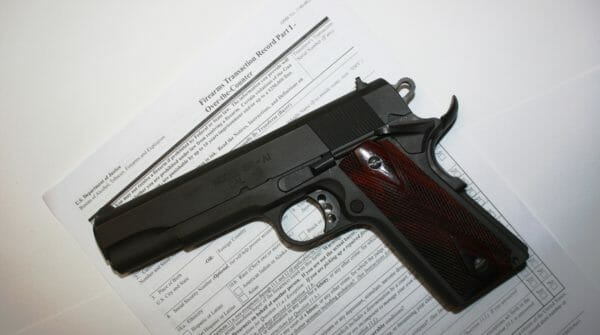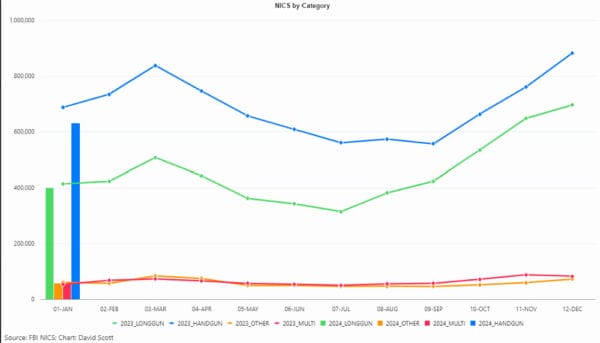
The January 2024 National Instant Background Check System (NICS) shows the number of guns sold for the month is very close to the average for the last ten years. From 2015 through 2024, the number of guns sold in January varied from .98 million in 2018 to 2.02 million in 2021. The average was 1.21 million. The 2024 number is 1.15 million. This is a 5.8% decrease from gun sales in January of 2023. Background check numbers varied more than gun sales, from 1.77 million in 2015 to 4.32 million in 2021.
The number of background checks does not correlate well with gun sales because the NICS system is used for many things other than gun sales. The number of checks done for carry permits and carry permit rechecks often exceeds the number for handgun and long gun sales. Because of this, a detailed analysis of the FBI NICS numbers is necessary to determine a close approximation of gun sales. 24 states have permits that require a background check to obtain, such as a carry permit, and the permit can be used to purchase firearms without another NICS check. One NICS check can be used for multiple firearm purchases. Illinois and Kentucky have, at times, used the NICS system to check all of their carry permits every month, vastly inflating the number of NICS checks.
In the last ten complete years of NICS checks, 2014 – 2023, 145 million firearms have been added to the private stock in the USA.


The 145 million number was calculated using the ATF numbers for the first eight years and estimates based on the NICS background checks for the last two years. The total number of private firearms in the United States is now over 500 million. The number of private firearms in the USA doubled since 1997. Over half of the private firearms in the USA are less than 26 years old. Firearms, with minimal care, last for centuries.
The most common reason given for owning a firearm is protection. According to the Pew Research Center, this percentage has increased five points from 2017 to 2023. This fits well with the theory of gun ownership increasing because of chaos in the international scene and chaos in the urban United States. The theory is bolstered by the increasing number of new gun owners who are black people, women, and Asians. The idea of ownership of weapons to increase security is as old as humanity. The recent political theorem that the ownership of weapons presents a greater danger to the owner than to their foe does not have the pedigree, common sense appeal, or personal and anecdotal evidence of validity that the ownership of weapons has.
Personal experience has taught most people to distrust statistical evidence presented to promote a political agenda.
Only in a hyper-safe, urban, and stable environment can a case be credibly made the presence of personal weapons renders a person less safe, and only when the risk of suicide is included in the mix. Hyper-safe, urban, stable environments are historically fragile and rare. Only a few civilizations have been able to produce and maintain them for relatively short periods. In such unusual cases, segments of the population can be convinced the ownership of weapons is a greater risk than not owning them. As international and urban chaos increases, such segments of the population shrink, and more people opt to own personal weapons.
About Dean Weingarten:
Dean Weingarten has been a peace officer, a military officer, was on the University of Wisconsin Pistol Team for four years, and was first certified to teach firearms safety in 1973. He taught the Arizona concealed carry course for fifteen years until the goal of Constitutional Carry was attained. He has degrees in meteorology and mining engineering, and retired from the Department of Defense after a 30 year career in Army Research, Development, Testing, and Evaluation.







